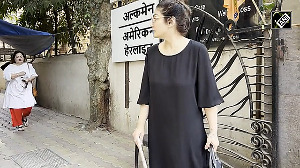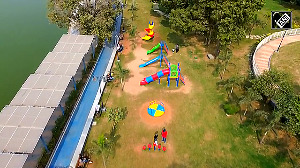Dodaballapur, the industrial area on the outskirts of Bangalore, is suddenly buzzing with activity. For it is in this unlikely locale that high fashion jeans, which will later be shipped to global retail outlets such as Levi's, Gap, Zara, H&M and Next, are made. And they are not simply stitched but made with computerised cutting, automatic sewing and laser blasting.
In July this year, Raymond put the finishing touches to its high-tech denim manufacturing facility, Everblue Apparel, in Dodaballapur.
The company plans to supply three million pairs of denim jeans per year out of this plant to customers across the world. With the removal of quota barriers worldwide, Raymond is cashing in on the opportunity of an increased global presence available now to textile manufacturers from India. And to meet supply orders on time, Raymond has invested Rs 45 crore (Rs 450 million) in Everblue Apparel.
The project has also substantiated Raymond's forward linkage plan to provide its global customers with a complete textile solution. Raymond's chairman and managing director Gautam Singhania is naturally excited.
"This plant will put Raymond in a strong position in the overseas market and we expect exports to make up 60 per cent of our denim sales soon," he says.
Singhania also claims that the company will leverage its presence in high-end ring denim, which goes into making quality products. "We have chosen denim as a thrust area for our global forays and our presence in ring denim will give our products wider appeal," says Singhania.
With an investments of Rs 450 crore (Rs 4.5 billion) in its existing denim plant in Maharashtra, the company has also charted out an ambitious plan of adding 10 million metres to its total denim production, taking it to 40 million metres by early next year.
However, denim is not the only product earmarked for the overseas market. Last year, Raymond set up Silver Spark, which manufactures formal suits and trousers for international customers.
"We are already in the second stage of expansion in the overseas market, and are getting into outsourcing and tie-ups in places like Dubai, Malaysia and the Middle East. The company is already present in Thailand, Sri Lanka and Bangladesh. Once we have the right scales, we will enter the US and UK markets. That will be the third stage of overseas expansion," says Singhania.
Back home, the company's focus is on its high-end menswear through brands like Manzoni and Park Avenue, managed by Raymond Apparel Ltd. Manzoni's first exclusive showroom opened in Delhi in June this year. Currently, RAL is working on its two other showrooms - one in Mumbai and one in Delhi.
And while Manzoni still contributes to only 5 per cent of the total apparel business, according to Singhania, it will still help the group consolidate its apparel business. Its limited editions are expected to offer exclusivity to the discerning man, and with its range of suits, jackets, shirts, trousers and accessories, Raymond is also setting up 50 shop-in-shop Manzoni outlets in the chain 'The Raymond Shop' throughout the country.
However, the big question is, will Manzoni cannibalise its own sister brand, Park Avenue?
"In terms of positioning, Park Avenue is a premium lifestyle brand, whereas Manzoni is a luxury lifestyle brand. In terms of product and price positioning, we are at very different levels; hence, Manzoni has not cannibalised Park Avenue business," says Shreyas Joshi, president, RAL.
Raymond has strategically put the two brands in different price categories: Manzoni begins where Park Avenue ends. With Park Avenue occupying a good 60 per cent share in Raymond's apparel business, Joshi says, they will have five more exclusive showrooms for the brand by December 2005. But a revamp exercise is on across brands.
"In the last two years we have revamped all the brands to enrich them with contemporary designs and styles, comparable to anywhere in the world," says Joshi.
Industry analysts, however, point out that it is the mid-price Parx brand, which needs to be watched. "With any number of brands coming in and going out, how is Raymond managing to keep Parx afloat?" says a Mumbai-based analyst. Joshi, however, is not disturbed.
"We agree that there is a plethora of casualwear brands in the market. In order to have its own distinct identity, we are transforming Parx more and more into casualwear products suitable for various outdoor occasions like leisure, travel and celebrations both during the day and evening," he says.
While apparel seems to be the focus area, Raymond is also putting necessary funds into its textile projects. For instance, in worsted suiting fabric, it is expanding capacity by three million metres by early next year, taking the total capacity to 28 million metres.
For shirting, it recently set up a new plant, Celebration Apparel, near Bangalore with an investment of Rs 14 crore (Rs 140 million). This will produce 3,000 shirts per day in the first phase and 6,000 per day in the second.
In March this year, Raymond closed a Rs 206 crore (Rs 2.06 billion) deal with Italy's Gruppo Zambaiti to set up a greenfield facility in India for the manufacture of high value cotton shirting fabric. The facility will manufacture fine cotton and cotton linen shirting fabric with a capacity of 11.5 million metres.
So do these developments suggest that the Rs 2,000 crore (Rs 20 billion) Raymond Group is well on its way to achieving its target of making textile and apparel each comprise 50 per cent of sales? And by when? "It's too early to set a timeframe but I can say we are inching towards our target," says Singhania.his words.







 © 2025
© 2025